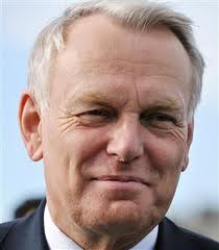Dec. 1, 2014
Breaking news

However, France and Germany have asked 27 November 2014 to the European Commission to take steps against those who hold the platforms on the Internet, including search engines. Everyone knows that this is the famous "GAFA" (Google, Apple, Facebook and Amazon).
It seems that the EU institutions fit, since the European Parliament voted on November 27 a text saying that it could ban these companies to monetize their platform activities themselves.
By their regulatory perspectives, Europe gets "retrograde" against the US dynamism?
At first glance, one might say. But it may be that these companies have become "critical", they take the heart of the digital economy, or even the knowledge economy and social cohesion. In such cases, the regulation of these objective phenomena justifies intervene directly in companies in which the social group comes to identify itself. If the company comes to stifle others, it is not that it stifles competition only, but innovation and free expression.
Then pass the mere vigilance competition law instruments of regulation, common in banking and financial law, such as transparency requirements.
This demonstrates Regulation and Supervision meet when companies become crucial.
Updated: Oct. 5, 2012 (Initial publication: Sept. 18, 2012)
Breaking news

Updated: Sept. 25, 2012 (Initial publication: Dec. 5, 2011)
Sectorial Analysis

Translated Summaries
In The Journal of Regulation the summaries’ translation are done by the Editors and not by the authors
ENGLISH
The European Commission issued a reasoned opinion on November 24th, 2011, to France and the Czech Republic demanding that those countries modify their legislation in order to comply with European regulation on renewable energies. If the modifications are not implemented in the upcoming two months, the Commission will open a case before the European Court of Justice.
FRENCH
La Commission européenne a émis un avis motivé le 24 Novembre 2011, concernantla France et la République tchèque, exigeant que ces pays modifient leur législation afin de se conformer à la réglementation européenne sur les énergies renouvelables. Si les modifications ne sont pas mises en œuvre dans les deux prochains mois, la Commission ouvrira une procédure devant la Cour de justice de l’Union européenne
ITALIAN
Il 24 novembre 2011, la Commissione europea ha emesso una raccomandazione con cui richiede alla Francia ed alla Repubblica Ceca di modificare le proprie legislazioni in modo tale da conformarle alla regolamentazione europea in materia di energia rinnovabile. Se le modifiche non saranno introdotte entro i prossimi due mesi, la Commissione adirà la Corte di Giustizia Europea.
....................
Other translations forthcoming.
Updated: Sept. 19, 2012 (Initial publication: July 12, 2012)
Sectorial Analysis

Translated summaries
ENGLISH
France and Italy had subsidized rail alpine highway, but the project was behind schedule. Thus, an prolongation of governments support was necessary. The European Commission admittedit in its decision of 11 June 2012, because States are committed the concession will be effective on June 30, 2013 and mostly because this mode of transport will be an alternative to transporting goods.
FRENCH
La France et l’Italie avaient subventionné l’autoroute ferroviaire alpine, mais le projet a pris du retard. Ainsi, une prolongation du soutien des gouvernements était nécessaire. La Commission européenne l'a admis dans sa décision du 11 Juin 2012, parce que les États se sont engagés et que la concession sera effective le 30 juin, 2013, surtout parce que ce mode de transport sera une alternative au transport routiers par camions des marchandises.
Updated: Sept. 10, 2012 (Initial publication: June 8, 2012)
Sectorial Analysis

Updated: Sept. 3, 2012 (Initial publication: Aug. 28, 2012)
Breaking news

Updated: July 13, 2012 (Initial publication: July 13, 2012)
Contributions

Updated: July 9, 2012 (Initial publication: July 3, 2012)
Breaking news

Updated: May 29, 2012 (Initial publication: May 15, 2012)
Breaking news

Updated: March 5, 2012 (Initial publication: Feb. 23, 2012)
Contributions

Updated: Feb. 2, 2012 (Initial publication: Dec. 23, 2011)
Thesaurus : Doctrine

Updated: Jan. 16, 2012 (Initial publication: Oct. 12, 2011)
Translated Summaries

Updated: Jan. 4, 2012 (Initial publication: July 1, 2011)
Contributions

Updated: Jan. 4, 2012 (Initial publication: May 28, 2011)
Releases : I. Isolated Articles
Translated Summaries
ENGLISH
Two and a half years after having been established by the LME, the French Competition Authority has uncontestably acquired its “place in the sun” amongst the competition authorities of other countries, as demonstrated by multiple indicators.
ITALIAN
Articolo: L’Autorità garante della concorrenza tra “regolazione” e politica in materia di concorrenza
Due anni e mezzo dopo l’instaurazione da parte del LME, l’Autorità francese garante della libera concorrenza ha trovato il suo posto tra le diverse autorità degli altri paesi, così come è stato dimostrato da diversi indicatori.
SPANISH
Artículo: La Autoridad de la competencia, entre “regulación” y política competitiva.
Después de dos años y medio de haber sido establecido por el LME, la Autoridad francesa de la competencia ha incontestablemente adquirido su “lugar bajo el sol” entre las autoridades de la competencia de otros países, como demostrado por varios indicadores.
.....................
Other translations forthcoming.
Updated: Jan. 2, 2012 (Initial publication: Jan. 2, 2012)
Thesaurus : Doctrine
Updated: Dec. 21, 2011 (Initial publication: Dec. 13, 2011)
Contributions

Updated: Dec. 13, 2011 (Initial publication: Oct. 18, 2011)
Contributions

Updated: Dec. 6, 2011 (Initial publication: Oct. 12, 2011)
Bibliographic Reports : Books

Translated Summaries
In The Journal of Regulation the summaries’ translation are done by the Editors and not by the authors
ENGLISH
Bibliographic Report (Book): The regulation of industrial networks, what evolutions and perspectives in France and in Europe? by Fondation Nationale Entreprise et Performance
Full citation: Fondation nationale Entreprise et Performance, La régulation des réseaux industriels. Quelles évolutions et perspectives en France et en Europe?, Preface Hagelsteen, Marie-Dominique, 105 p., La documentation Française, 2011.
Report by Marie-Anne Frison-RocheManaging Editor and Director
This report ambits to improve the regulation of industrial networks in France and in Europe. Therefore, the Fondation nationale Entreprise et Performance (FNEP) concentrates its study on industrial networks, a category in which it includes telecommunications, energy, rail transportation, and postal services, in France and in Europe. The report proposes new rules or adaptations to old ones in order to increase regulators’ independence, efficacy, and oversight. It then suggests rules be modified to allow for the implementation of regulation at the European level, whenever the relevant market is European in scale.
FRENCH
Compte-rendu bibliographique (Livre): La régulation des réseaux industriels. Quelles évolutions et perspectives en France et en Europe ? par Fondation Nationale Entreprise et Performance.
Compte-rendu faite par Marie-Anne Frison-Roche
Ce rapport ambitieux vise à améliorer la régulation des réseaux industriels en France et en Europe. Par conséquent, la Fondation nationale Entreprise et Performance (FNEP) concentre son étude sur les réseaux industriels, une catégorie dans laquelle le rapport inclut les télécommunications, l’énergie, le transport ferroviaire, et les services postaux, en France et en Europe. Le rapport propose de nouvelles règles ou des adaptations de précédentes, afin d’accroître l’indépendance des régulateurs , d’augmenter l’efficacité et la surveillance. Il propose ensuite que des règles soient modifiées pour permettre la mise en œuvre de la régulation au niveau européen, chaque fois que le marché pertinent est de dimension européenne.
ITALIAN
Relazione bibliografica (Libri): III-1.9: La regolazione delle reti industriali. Quali sono le evoluzioni e le prospettive in Francia e in Europa? A cura della Fondation Nationale Entreprise et Performance
Questa relazione punta a migliorare la regolazione delle reti industriali in Francia e in Europa. Tuttavia la “Fondation Nationale Entreprise et Performance” (FNEP) focalizza la sua attenzione sulle reti industriali, una categoria che include le telecomunicazioni, l’energia, il trasporto ferroviario ed i servizi postali, in Francia ed in Europa. La relazione propone delle nuove regole o una modifica delle regole esistenti per aumentare l’indipendenza, l’efficacia e la vigilanza delle autorità di regolazione. Inoltre, propone di modificare alcune norme per permettere l’applicazione della regolazione al livello europeo, ogni volta che il mercato rilevante è quello europeo.
.....................
Other translations forthcoming.
Updated: Sept. 26, 2011 (Initial publication: June 7, 2011)
Releases : I. Isolated Articles

Translated Summaries
ENGLISH :
This article provides an economic perspective on the role played by
competition policy in the development of competition in various
transport sectors. After a brief reminder of some economic features that
are shared by different transport modes, it mainly examines the
principles and practical underpinnings of merger control as it is
implemented in the present context of rapid consolidation in some
transport sectors. Thereby, it stresses some potential shortcomings of
the traditional merger regula tion approach in the particular context of
transportation services, pointing to an excessive attention paid to
potential competition issues on overly narrow relevant markets while
largely ignoring global efficiency-enhancing effects of mergers and
alliances.
ITALIAN
Articolo: Trasporti, concorrenza e politica in material di concorrenza.
Questo articolo delinea una prospettiva economica del ruolo della politica in materia di concorrenza nello sviluppo della libera concorrenza in vari settori dei trasporti. Dopo un breve richiamo ad alcuni aspetti economici, comuni a diversi tipi di trasporto, l’articolo passa in esame i principi e le pratiche fondamentali del controllo delle concentrazione cosi come applicato nell’attuale contesto di consolidamento di alcuni settori dell’industria dei trasporti. Tuttavia, l’articolo mette in rilievo ugualmente alcune carenze potenziali di un approccio classico della regolazione delle concentrazioni nello specifico settore dei trasporti, tra cui l’eccessiva attenzione data alle questioni di concorrenza potenziale su mercati di dimensioni ridotte e la noncuranza generalizzata degli effetti di alleanze e fusioni in materia di efficacia e di progresso.
SPANISH
Artículo: Transporte, competencia y política competitiva
Este artículo da una perspectiva económica sobre el rol jugador por la política de la competencia y el desarrollo de la competencia en varios sectores de transporte. Después de un breve recordatorio sobre las características económicas compartidas por diferentes modales de transporte, examina principalmente los principios y detalles prácticos de la implementación de control de uniones en el contexto presente de consolidación rápida en algunos sectores de transporte. El artículo pone énfasis algunos de los defectos potenciales del la regulación tradicional de uniones, particularmente en el contexto de los servicios de transporte, indicando un enfoque excesivo a cuestiones de competencia potencial en mercados demasiado estrechos y a la vez ignorando los efectos del mejoramiento de eficacia global de las uniones y las alianzas.
PORTUGUESE
Artigo: Transporte, concorrência e política concorrencial
Este artigo fornece uma perspectiva econômica sobre o papel exercido pela política concorrencial no desenvolvimento da concorrência em diversos setores de transporte. Após uma breve retomada de conceitos econômicos compartilhados por modos de transporte diferentes, ele examina principalmente os princípios e os problemas práticos do controle como implementado no contexto presente de rápida consolidação em alguns setores de transporte. Assim, ele sublinha alguns potenciais conflitos no enfoque da regulação tradicional no contexto particular de serviços de transporte, apontando para uma atenção excessiva concedida para problemas de concorrência potencial em muito relevantes mercados enquanto são amplamente ignorados os efeitos na eficiência global.
Transporte aéreo – Avião – Aeroporto – Aliança – Comportamento anti-concorrencial – Falência – Concorrência – Autoridade de concorrência – Política de concorrência – Concentração – Contrato – Subsídios cruzados – Economia de escala – Eficiência – Ganho de eficiência – Barreiras de entrada – Equilíbrio – Comissão Europeia – Custo fixo – França – Londres – Incentivo – Operador incumbente – Infraestrutura – Interconexão – Investimento – Monopólio legal – Liberalização – Rede de longa distância – Estrutura de mercado – Controle – Firma de multiprodução – Rede – Mercado oligopolístico – Concorrência potencial – Preço – Elasticidade de preço – Trilho – Transporte por trilhos – Mercado relevante – Transporte rodoviário – Segmento – Serviço – Tempo – Transporte – Reino Unido – Comunidade urbana – Veículo.*
* Em The Journal of Regulation, estas palavras-chave são fornecidas pelo Editor e não pelo Autor.
.....................
Other translations forthcoming.
Updated: Aug. 31, 2011 (Initial publication: July 6, 2011)
Contributions

Updated: Aug. 31, 2011 (Initial publication: June 15, 2011)
Contributions

Updated: June 24, 2011 (Initial publication: June 15, 2011)
Releases : I. Isolated Articles

ENGLISH
The role of fibre is very important towards connecting to ultra-fast broadband, one of the key action areas of the Digital Agenda. But, Europe is late in its fibre deployment, especially when compared to other advanced economies such as the United States or Japan. At the same time, however, there is still no standard for a European fibre strategy: public as well as private stakeholders are having very different approaches in local FTTx deployment sometimes leading to a waste in private and public funds and being mainly focused on dense areas. This article aims to propose an efficient model for fibre network deployment that can be applied to all European Member States. The model provides high-margin incentives for operators to install fibre network across the whole country, while maximising households’ fibre connection rate through an automatic migration scheme. In a period of weak growth and budget restrictions, the catch-up in ultra-fast broadband internet requires more than ever an efficient policy to maximise the deployment of FTTH at the lowest cost possible to the public. The proposed model serves as an ideal choice given this context.
Alternative operator - Budget - Connexion - Copper network - Cost - Digital agenda - Duplication - Effeciency - Essential facility - Europe - Fiber optic - France - Incentive - Incumbent operator - Infrastructure - Internet - Natural economic monopoly - Network - Price - Provider - Regulatory policy *
* In The Journal of Regulation, these keywords are done by the Editor and not by the Author.
PORTUGUESE
Artigo: Do cobre à fibra: uma política de regulação ótima.
O papel da fibra é muito importante em conexões de banda larga de alta velocidade, uma das principais ações na área da Agenda Digital. No entanto, a Europa está atrasada no desenvolvimento da fibra, especialmente quando comparada com outras economias avançadas como Estados Unidos ou Japão. Ao mesmo tempo, porém, ainda não há um patamar para uma estratégia europeia para a fibra: detentores de haveres públicos e privados têm tido diferentes posturas no desenvolvimento de FTTx local, o que leva às vezes a um desperdício de fundos públicos e privados e sendo sobretudo registrado em áreas de densidade. Este artigo objetiva propor um modelo eficiente para o desenvolvimento da rede de fibra que possa ser aplicado para todos os Estados Membros Europeus. O modelo prevê incentivos altos para operadores para instalar redes de fibra por todo o país, enquanto maximiza a taxa de conexões domésticas de fibra através de um esquema de migração automática. Em um período de crescimento desacelerado e restrições orçamentárias, um novo impulso em banda larga de alta velocidade requer mais do que nunca uma política eficiente para maximizar o desenvolvimento de FTTH ao menor custo possível para o público. O modelo proposto serve como uma escolha ideal dado este contexto.
Operador alternativo – Orçamento – Conexão – Rede de cobre – Custo – Agenda digital – Duplicação – Eficiência – Facilidades essenciais – Europa – Fibra ótica – França – Incentivo – Operador – Infra-estrutura – Internet – Monopólio natural econômico – Rede – Preço – Provedor – Política de regulação*.
* No Journal of Regulation, as palavras-chave são fornecidas pelo Diretor, e não pelo Autor.
ITALIAN
Articolo: Dal rame alla fibra: un’ottima politica di regolazione
Il ruolo della fibra è molto importante per la connessione ad alta velocità, una delle azioni centrali dell’agenda digitale. Tuttavia l’Europa è in netto ritardo per quando riguarda lo sviluppo della fibra, in particolare rispetto all’economia di altri paesi come gli Stati Uniti o il Giappone. Questo si capisce, però, in quanto non esiste uno standard per la strategia dell’Europa in materia di fibra: gli attori privati e pubblici del settore della fibra stanno avendo degli approcci differenti nei confronti della realizzazione dei FTTx, e tali approcci spesso si concludono in uno spreco di investimenti e si concentrano spesso su aree ad alta densità. Questo articolo si propone di trovare un modello efficace per la realizzazione di una rete a fibra in tutti gli Stati membri. Questo modello prevede degli incentivi elevati per gli operatori che installano delle reti a fibra ottica nei loro paesi, e massimizza la percentuale di connessioni a fibra ottica per nucleo familiare con un sistema di migrazione automatico. In un periodo di crescita ridotta e restrizioni di budget, lo sviluppo di connessioni a fibra ottica richiede una politica quanto mai efficace per massimizzare lo sviluppo del FTTH ai minimi costi possibili per i conti pubblici. Il modello proposto costituisce una scelta essenziale, in considerazione del contesto esistente.
Agenda digitale - Budget - Connessione - Connessioni su rame - Costi - Duplicazione - Efficienza - Europa - Fibra ottica - Fornitore - Francia - Incentivi - Infrastruttura - Infrastruttura essenziale - Internet - Monopolio economico naturale - Operatore alternativo - Operatore storico - Prezzo - Politica di regolazione - Rete *
* In The Journal of Regulation, le parole chiave sono responsabilità dell’Editore e non dall’Autore.
SPANISH
Artículos: Del cobre a la fibra : una política regulatoria óptima
El rol de la fibra óptica es de gran importancia en lo que concierne la conexión al ancho de banda ultrarrápida, una de las áreas claves de acción en la Agenda Digital. Sin embargo, Europa se encuentra atrasada en cuanto a su desarrollo, especialmente en comparación con otras economías avanzadas, como la de los EEUU o Japón. No obstante, todavía no existe un estándar para una estrategia europea para la red de fibra óptica; accionistas, tanto privados como públicos, han estado adoptando diferentes acercamientos a la implementación de los FTTx, lo cual suele llevar a un enfoque sobre áreas demasiado densas y al desperdicio de fondos privados y públicos. Este artículo tiene como objetivo proponer un modelo eficiente para el desarrollo de la red de fibras ópticas que podría aplicarse a todos los miembros de la Unión Europea. El modelo provee incentivos de gran margen de ganancias para operadores para la instalación de estas redes de fibras a través del país entero y al mismo tiempo maximiza la conexión rápida de fibras en todas las viviendas facilitado por el uso de un esquema de migración automática. En un periodo de crecimiento débil y restricciones presupuestarias, el “catch-up” en el Internet de banda ancha ultrarrápida requiere ahora más que nunca una política eficaz para maximizar el desarrollo del FFTH y minimizar el coste incurrido por el público.
Other translations forthcoming.
